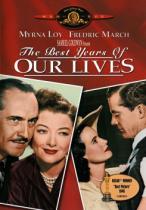The Best Years of Our Lives
 Year:
Year: 1946
Film Studio: Sam Goldwyn Productions
Genre: Drama, Classic
Length: 170 Min.
DirectorWilliam Wyler (1902)
WritingRobert E. Sherwood (1896)...Screenwriter
MacKinlay Kantor (1904)...Original Material By
ProducerSamuel Goldwyn (1879)
CinematographerGregg Toland (1904)
MusicHugo Friedhofer (1901)...Composer
StarsMyrna Loy (1905) as Milly Stephenson
Fredric March (1897) as Al Stephenson
Dana Andrews (1909) as Fred Derry
Teresa Wright (1918) as Peggy Stephenson
Virginia Mayo (1920) as Marie Derry
Cathy O'Donnell (1923) as Wilma Cameron
Hoagy Carmichael (1899) as Butch Engle
Harold Russell (1914) as Homer Parrish
Review After five years of churning out propaganda style war films backing the efforts of the Allies in their fight against the totalitarianism of the Axis powers, Hollywood would not only create celebratory films about the exploits of the victorious armed forces, but would also focus in on the adjustment to peacetime life at home facing many of the returning veterans. With the advances made in the art of mechanized warfare dominating the two major World Wars that had engulfed the globe, war had taken on a new persona. No longer would the populations of warring nations view battle as a noble and chivalrous adventure, as many of their returning soldiers came home bearing psychological as well as physical scars from the battlefield. Thrown into the mix were the scores of men and women who had kept the home fires burning and were about to be displaced from their wartime work positions by the ever burgeoning number of discharged G.I.’s.
Director William Wyler would showcase this new war on the home front in the Oscar winning,
The Best Years of Our Lives in 1946. Starring Frederic March, Dana Andrews and Harold Russell as three recently discharged soldiers, each from a different branch of the armed services, sharing a flight home to the fictional town of Boone City. At first they are enthusiastic about their return home, but as the plane lands and they share a taxi ride to their respective homes, a sense of apprehension grips them as they wonder how five long years may have changed their way of life. Each will wrestle with his own personal demons, born in the war and coming to fruition in the coming months. Of the three, Homer (Russell) will have the greatest adjustment to make in civilian life, as an accident in boot camp deprives him of the use of both hands. As family members help each man to come to grips with their physical, psychological and personal problems, they will come to learn that the code of honor amongst soldiers is in short supply across the general population, leaving each man to assert his own control of their particular destinies.
For its time, this film was groundbreaking in its portrayal of the problems facing returning war veterans, but by today’s standard is pretty sparse on revelation. It is by no means as in depth a psychological depiction of the troubles facing returning soldiers as Hal Ashby’s
Coming Home from 1978. That being said, it is an engaging drama which manages to take hold of the viewer, and illustrate a great generation of Americans and their way of life that has since vanished.
Ratings Criterion
- The pinnacle of film perfection and excellence.

- Not quite an immortal film, yet a masterpiece in its own right.

- Historically important film, considered a classic.

- An entertaining film that’s fun or engaging to watch.

– A good film that’s worth a Netflix venture.

- Borderline viewable.

– A bad film that may have a moment of interest.

– Insipid, trite and sophomoric, and that's its good points.

– A film so vacuous, it will suck 2 hours from the remainder of your life.

- A gangrenous and festering pustule in the chronicles of celluloid.